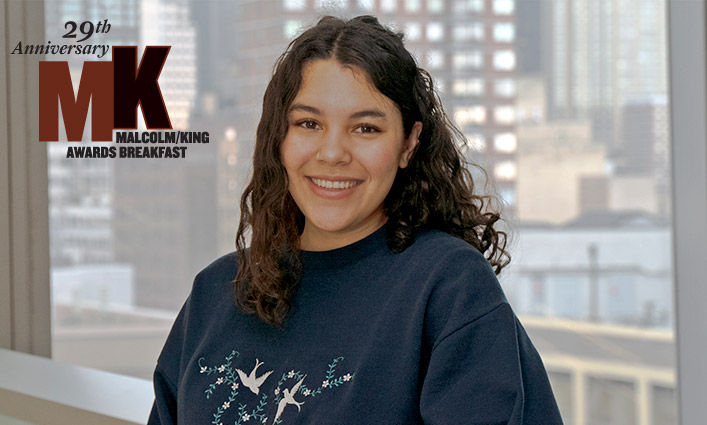
To continue our celebration of Black History month, and in anticipation of our 29th Malcolm/King Awards Breakfast, we spoke with the recipients of the Malcolm/King Awards. Their success serves as an inspiration to students of all races, and their deep understanding and appreciation of African-American history is a testament to the many contributions African-Americans have made to this country. Our next “Malcolm/King Award Spotlight” is Natalie Massimi, a freshman majoring in Political Science.
February is Black History Month. What does it mean to you to celebrate the many achievements African-Americans have contributed to this country?
I identify as Afro-Latina. My mom is Dominican and my dad is white. So, for me, Black History Month is about highlighting a part of history that is often overlooked.
What goals do you have for advancing equality and fairness for all people, especially African-Americans?
I think that as a society, we need to be focusing more on equity rather than equality. If we are looking at a group of people who are disadvantaged and we treat everyone the same, the disadvantaged group will still come up short. We have to be careful and make sure that we are distributing more to the people who actually need it over those who do not.
“We need to be focusing more on equity rather than equality. If we are looking at a group of people who are disadvantaged and we treat everyone the same, the disadvantaged group will still come up short.” —Natalie Massimi
When you think of African-American history, what makes you the proudest?
What makes me the proudest is the resiliency of all those that came before me. These people advanced despite all the obstacles they faced. I find it so inspirational that people who were so disadvantaged were able to make such a tremendous mark on history. The work that they did for us is amazing.
If you could talk to Malcolm X or Dr. Martin Luther King Jr., what would you ask them?
I've always been very interested in Malcolm X and I know that his life ended before he was able to expand his more inclusive ideology. I would ask him, how were you able to overcome hatred? I grew up in a predominately white area where I was the only person of color, and I was not treated very well. I moved to New York and have realized that not everyone is the same. After a childhood filled with such trauma, it’s difficult to not be wary and fearful of history repeating itself. I would like to know how I could stop letting how people treated me in the past, interfere with the way I perceive people now.
Dr. King once famously said, “Let us realize the arc of the moral universe is long, but it bends toward justice.” As a student at a school focused on justice, what does that quote mean to you?
I understand this quote to mean that in the history of everyone’s life, there will be a lot of injustices and there will be instances in which we will ask why certain things are happening. But, we shouldn’t let injustices get to us and we should be encouraged by the fact that all of the wrongs will eventually be righted.
“We shouldn’t let injustices get to us and should be encouraged by the fact that all of the wrongs will eventually be righted.”—Natalie Massimi
What does it mean to you to receive the Malcolm/King Award?
Winning this scholarship is very validating. Dr. King and Malcolm X were always inspiring figures for me, but I don’t think my perception of them was shared where I grew up in Arizona. Winning this scholarship has shown me that my opinion matters, and it’s also a huge financial help. Being from Arizona, I haven't been able to go home and see my grandparents, and I miss them. Tuition is a very large factor in my life and this scholarship is easing a financial burden.
If everything goes according to plan, where do you see yourself in 10 years?
When I think about my future I see a lot of different paths that I can go down. I've considered going into policy work, joining a think tank, becoming a lawyer, or even becoming a public defender. But in general, in 10 years, I just want to be doing something I'm passionate about. I'm very passionate about racial equality and racial issues, but if I could pinpoint a certain issue, it would be criminal justice reform and the way that people who have committed crimes in this country are treated unfairly. If I could do something to start alleviating and giving more rights to the formerly incarcerated, that's something I would like to do.



